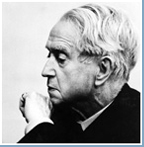Herbert Howells Biography - A Very Quick Guide
Herbert Howells (17 October 1892—23 February 1983) was an English composer whose very long life allowed him to produce an enormous body of work in a traditional English vein.
Howells was born in Lydney, Gloucestershire and was a boyhood friend of fellow composer and Gloucester native Ivor Gurney. His father was an amateur organist, and the boy showed early musical promise. He studied first with Herbert Brewer, the organist of Gloucester Cathedral and later at the Royal College of Music under Stanford and Charles Wood. He was briefly assistant organist at Salisbury Cathedral in 1917 (later serving as acting organist of St. John's College, Cambridge during World War II) and in his twenties and thirties composed chiefly orchestral and chamber music, including two piano concertos. The hostile reception given to the second of these effectively silenced Howells's compositional activities for some time, but the death of his son Michael from polio (or meningitis; accounts vary) in 1935 unleashed a new period of creativity. Though not an orthodox Christian, he became increasingly identified with the composition of religious music, most notably the Hymnus Paradisi for chorus and orchestra. This was composed after his son's death but not released for performance until 1950, at the insistence (according to Howells' own account) of his close friend and mentor Ralph Vaughan Williams. It incorporates passages from an unaccompanied Requiem, begun before Michael's death but not published until 1981, with a dedication to his memory.
Hymnus Paradisi was the first of four large-scale sacred choral works. His Missa Sabrinensis is on the same scale, in terms of length and forces required, as Beethoven's Missa Solemnis, while An English Mass is scored for significantly smaller forces, is performed almost entirely in English, and follows the Anglican tradition of placing the Gloria last. Finally, Howells' setting of the Stabat Mater, at about 50 minutes, is one of the longest extant settings of that text.
Howells is particularly known for his large output of Anglican church music, including a complete Service for King's College, Cambridge and settings of the Magnificat and Nunc dimittis for the choirs of St. Paul's and Gloucester Cathedrals, amongst many others. The motet Take Him, Earth, for Cherishing was written shortly after the assassination and dedicated to the memory of President John F. Kennedy.
